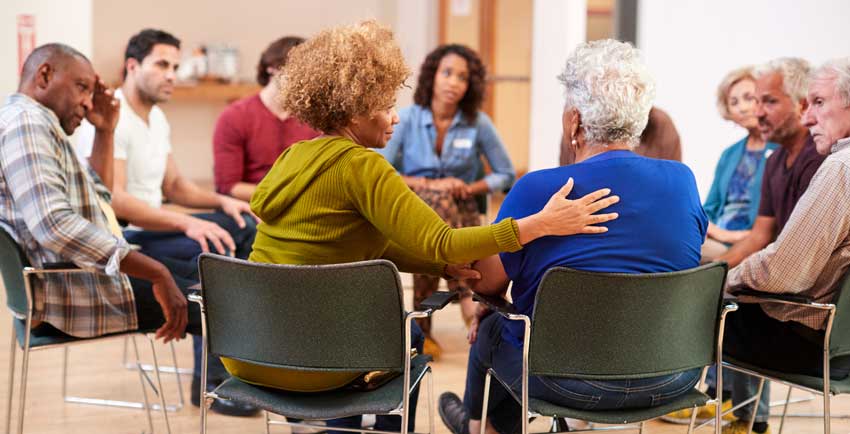
Radical Acceptance
Acceptance as a Method for Recovery
Table of Contents
If you are addicted to drugs or alcohol, you have a very real need to change. Otherwise, you may end up exposing yourself to severe or even fatal health consequences. Quite often, people in this dire situation deny the reality of what is happening to them. This denial can decrease your willingness to seek needed treatment. It can also decrease your willingness to fully participate once you enroll in treatment. Addiction specialists use a variety of methods to address this dilemma. Once such method is a concept called radical acceptance. Acceptance acts as a polar opposite of denial. When cultivated during substance treatment, it can potentially have major benefits for your recovery. One form of addiction therapy, called dialectical behavior therapy or DBT, relies on radical acceptance as one its core principles. This therapy can help you recover from drug or alcohol problems. It can also help you recover from the combined effects of substance problems and additional mental issues.
What Is Radical Acceptance
Human beings are hardwired to like certain kinds of experiences and dislike others. The exact lists of likes and dislikes vary from person to person. However, as a rule, the things you like have effects that include:
- Making you feel good
- Supporting your view of the world
- Increasing your sense of security
- Fulfilling your current wants and needs
- Providing an opportunity for more or greater fulfillment in the future
Immediate Placement in Drug Rehab
In contrast, the things you dislike have effects that include:
- Making you feel worse
- Going against your worldview
- Decreasing your sense of security
- Interfering with your current wants and needs
- Working against your opportunities for future fulfillment
Your likes and dislikes typically include specific thoughts and emotions. They also include specific circumstances or situations.
You tend to accept the things you like more willingly than the things you do not like. Some people have a fairly high level of tolerance for their dislikes. However, others have a stronger tendency to reject or deny the things they dislike.
The Concept of Reality Acceptance
Radical acceptance has its roots in philosophical ideas associated with Buddhism. At its core, it asks you to accept what is happening to you in any given moment. You may like what is happening or you may dislike it. It does not matter. You do not fight it or deny it. Instead, you accept it as part of the mix of thoughts, emotions and situations that form your daily existence.
This concept of reality acceptance is quite unfamiliar to most people. However, increasingly, addiction and mental health experts have begun to recognize its potential value. It may also have significant benefits for people not affected by substance or mental health issues.
DBT Therapy and Radical Acceptance Skills

Dialectical behavior therapy, or DBT, is a form of cognitive psychotherapy. Cognitive therapies get their name because they help you:
- Understand your thought processes and emotions
- Spot processes and emotions that damage your well-being
- Develop new ways thinking and reacting that do not damage your well-being
DBT gets its name from its unique approach. This approach asks you to consider and combine two seemingly opposing things:
- Acceptance of your current reality
- Change that alters that reality
Acceptance as the Answer
Dialectical behavior therapy focuses on two components of acceptance: mindfulness and distress tolerance. Mindfulness requires you to pay attention to the moment-to-moment details of your reality. Specific skills you work on in DBT include:
- Experiencing your present reality without passing judgment on it
- Describing the details of your reality in factual terms
- Focusing your attention on just one thought, emotion or situation at a time
You also focus on maintaining mindfulness while practicing the beneficial behaviors you have learned in DBT.
Distress tolerance is the other key component of radical acceptance. All people experience distress at one time or another. This distress may affect you physically. It can also affect your thinking and emotional reactions. When you are in distress, you feel extreme forms of feelings and sensations such as:
- Sorrow
- Pain
- Anxiety
- Unhappiness
- Discomfort
There is a good chance that you try to avoid these feelings and sensations whenever possible. However, distress of some kind is an inevitable part of life. The more you can tolerate distressing situations, the less likely you will be thrown off balance by them. You are also less likely to use any available means to try to escape what is happening to you.
As its name indicates, the goal of distress tolerance is to improve your ability to tolerate distress. When difficult thoughts, emotions or situations arise, you do not struggle against them. Instead, with the help of mindfulness, you let them be without trying to change them.
Immediate Placement in Drug Rehab
Radical Acceptance for DBT Therapists
In DBT, you do not work on your radical acceptance skills alone. Your therapist does the same thing along with you. Specifically, your therapist works on accepting:
- The difficulty of helping someone affected by substance or mental health problems
- The inevitable obstacles and setbacks that come with the treatment process
- Resistance from clients participating in DBT
- The chance that any given client may or may not benefit from DBT
Together, the work done by you and your therapist increases the odds of your treatment success.
The Role of Acceptance in Addiction Recovery
Acceptance without change will not help you recover from substance problems. Instead, you will just remain in your current pattern of harmful thoughts, reactions and behaviors. For this reason, radical acceptance forms just part of an effective recovery. You also need help making positive changes that support your return to sobriety.
Two components of DBT are dedicated to fostering change. The first of these components is emotion regulation. This portion of the therapy teaches you how to do things such as:
- Recognize specific emotions when they arise
- Understand the nature and effects of those emotions
- Clearly label each emotion as it occurs
- Control or regulate your reactions to each emotion
Therapists play a vital role in this process. Their tasks include:
- Using various cues to track your emotional reactions as they occur
- Helping you sort valid emotional responses from invalid responses
- Giving you practical tools for processing your emotions when you feel overwhelmed
The second method of change is training in interpersonal effectiveness. This training improves your ability to:
- Interact with others in ways that support mutual respect
- Clearly state what you do and do not want in a given situation
- Maintain your integrity and personal boundaries around other people
When Should I Use Radical Acceptance

Holistic Approaches to Your Health
Radical acceptance has clear usefulness in the context of formal treatment. However, it can also help you in everyday life. Setbacks and disappointments are recurring parts of everyone’s lives. Some of these unwanted events are relatively minor and do not seriously alter your circumstances. However, chances are you have also experienced major, life-altering events of one kind or another.
All of these occasions can be viewed as opportunities to practice radical acceptance. Bear in mind that the goal of acceptance is not to leave you stuck in undesirable situations. Instead, it aims to help you step back a bit and gain some perspective. In doing so, it also aims to help you avoid mistakenly making your situation worse. Even if you are not affected by substance or mental health issues, this skill can benefit you in many ways.
Achieving Long-Term Recovery With Radical Acceptance
Radical acceptance serves as a durable support for your long-term addiction or mental health recovery. It does so by making it easier for you to weather life’s unavoidable ups and downs. In situations that once triggered your symptoms, you gain the ability to do things such as:
- Process what is happening to you
- Maintain perspective on the situation at hand
- Manage unpleasant thoughts or emotions
- Steer clear of reactions that make your situation worse, not better
All of these things help increase the odds you will not experience a serious symptom relapse. In turn, they help you keep your recovery on track for extended periods of time.
Learn More About our Drug Rehab Program
Seek Help Cultivating a Practice of Acceptance at Emerald Isle
Radical acceptance is a skill that helps you cope with painful or unpleasant thoughts, emotions and situations. It forms a key part of dialectical behavior therapy, a treatment for both substance and mental health problems. By accepting the things you find unpleasant, you increase your ability to tolerate them. You also make it possible to recognize damaging reactions that have harmed you in the past.
In DBT, acceptance is followed by change. Your therapist shows you how to gain control over your thoughts and emotions. You also learn how to interact with others in ways that support your sense of well-being. Together, acceptance and change help set the stage for a lasting recovery.
Need help cultivating a practice of acceptance? The experts at Emerald Isle Health & Recovery are here to support you. We feature evidence-based therapy that teaches you effective acceptance skills. This therapy also shows you how to use acceptance as the foundation for meaningful change. To learn more about our holistic, customized approach, just call us today for more information.








